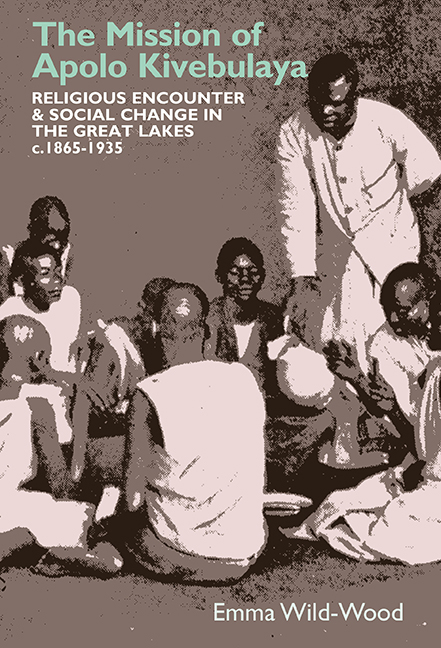Book contents
- Frontmatter
- Dedication
- Contents
- List of Maps and Photographs
- Acknowledgements
- Note on Orthography and Glossary
- Timeline
- Introduction: Kivebulaya and religious change in the Great Lakes
- 1 The afterlife of Saint Canon Apolo (1933 onwards)
- 2 Waswa, a commoner in the Kingdom of Buganda (c.1865–c.1884)
- 3 Munubi, a foot soldier in battle and evangelism (c.1884–1895)
- 4 Itinerant teacher ‘from Europe’ in Toro (1895–1905)
- 5 Clerk in holy orders (1905–1915)
- 6 To all Ituri nations under Belgian rule (1915–1925)
- 7 Reverend Canon Apolo, elder and churchman (1925–1933)
- Conclusion: African missionaries, religious encounter and social change 270
- Sources
- Index
- EASTERN AFRICAN STUDIES
4 - Itinerant teacher ‘from Europe’ in Toro (1895–1905)
Published online by Cambridge University Press: 30 April 2020
- Frontmatter
- Dedication
- Contents
- List of Maps and Photographs
- Acknowledgements
- Note on Orthography and Glossary
- Timeline
- Introduction: Kivebulaya and religious change in the Great Lakes
- 1 The afterlife of Saint Canon Apolo (1933 onwards)
- 2 Waswa, a commoner in the Kingdom of Buganda (c.1865–c.1884)
- 3 Munubi, a foot soldier in battle and evangelism (c.1884–1895)
- 4 Itinerant teacher ‘from Europe’ in Toro (1895–1905)
- 5 Clerk in holy orders (1905–1915)
- 6 To all Ituri nations under Belgian rule (1915–1925)
- 7 Reverend Canon Apolo, elder and churchman (1925–1933)
- Conclusion: African missionaries, religious encounter and social change 270
- Sources
- Index
- EASTERN AFRICAN STUDIES
Summary
Introduction
‘What worries the ant hunter,’ wrote Kivebulaya in his diary in Butiti in 1901, ‘is not having the knowledge about the inside of the [ant hill], or the heavens, or the storm, or the ants themselves.’ By comparing missionary work to the search for a local delicacy, Kivebulaya acknowledged the necessity of attending to the environment and behaviour of those he wished to evangelise. He expressed anxiety when his audiences were unreceptive to his message. ‘It was my habit to always be worried inside my soul. Whenever people did not come to Church, I would not eat food well but [would be] worrying.’ Nevertheless, he felt happy to be in Toro, ‘I explored the happiness that is in preaching the gospel, which is better than any other happiness.’ His pride in his role of teacher was mingled with the fear that the perceptions of his audience and his communication skills would limit his ability to transmit the Christian message and so effect religious change.
This chapter examines Kivebulaya's first decade in Toro (1895–1905). It places him within changing socio-political structures and explores the cultural assumptions that influenced the reception or rejection of new, imported ideas and practices that came most directly from Europe but were now mediated by Baganda emissaries. The chapter begins by situating Kivebulaya's role within Kasagama's ambitions to create a unified Christian kingdom following the Buganda example. It examines Kivebulaya's journeys to the peripheries of the kingdom (the accounts of which form the majority of his writings) and analyses the reception of Kivebulaya's mission beyond the centre of the kingdom and the church at Kabarole. Events articulated by Kivebulaya as a spiritual struggle to establish a conducive environment for the reception of God's word provide evidence of resistance to the religious and social change that Kivebulaya advocated. It is apparent that his preaching was contested and questioned, that many were indifferent, ambivalent or hostile but the historical sources provide limited insight into these reactions. Kivebulaya's mission was entangled in Kasagama's political vision for a united Toro under his rule and must be understood in this context – but it was not confined to this vision. Kivebulaya's shift in religious allegiance, observed in the previous chapter, was consolidated in Toro. His missionary impulses were honed through a profound spiritual experience and his acceptance of theological ideas that made sense of the misfortune that befell him.
- Type
- Chapter
- Information
- The Mission of Apolo KivebulayaReligious Encounter & Social Change in the Great Lakes c. 1865–1935, pp. 129 - 163Publisher: Boydell & BrewerPrint publication year: 2020



